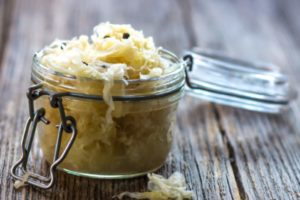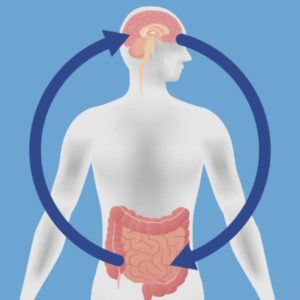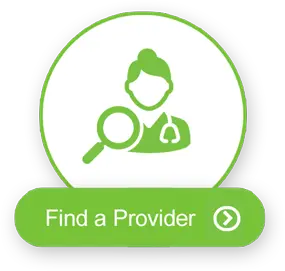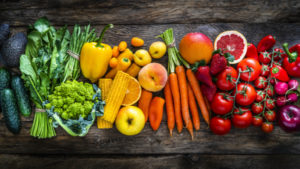
Maybe so. A growing body of research in the field of nutritional psychiatry supports the idea that what you eat can have a big impact on how you feel.
“While nutritional psychiatry is not a substitute for other treatments, the relationship between food, mood, and anxiety is garnering more and more attention,” writes Uma Naidoo, MD, in Harvard Health Publishing. “Be sure to talk to your doctor if your anxiety symptoms are severe or last more than two weeks. But even if your doctor recommends medication or therapy for anxiety, it is still worth asking whether you might also have some success by adjusting your diet.”
If you’d like to try eating into calmer state of mind, here are some points experts say to consider.
How diet may influence anxiety
First, it’s important to know that what you eat can affect how you feel in a number of ways. One way is through your body’s connection between your gut and your brain.

Your gut, in other words, may play a role in your mental health – for better or for worse. Choosing to eat certain foods may provide a needed boost for your mood or emotions.
“A diet rich in whole grains, vegetables, and fruits is a healthier option than eating a lot of simple carbohydrates found in processed foods,” writes Dr. Naidoo in the Harvard Health Publishing article. “When you eat is also important. Don’t skip meals. Doing so may result in drops in blood sugar that cause you to feel jittery, which may worsen underlying anxiety.”
Before looking to incorporate any specific foods, experts say to consider your diet as a whole. Are you drinking enough water to stay hydrated through the course of the day? Are you eating regular meals to avoid dips in your blood sugar? Water intake and when you eat may be important factors in mental health.
“Anxiety symptoms can make you feel unwell. Coping with anxiety can be a challenge and often requires making lifestyle changes,” writes Craig N. Sawchuk, Ph.D., L.P. on the Mayo Clinic’s website. “There aren’t any diet changes that can cure anxiety, but watching what you eat may help.”
What foods may reduce anxiety?
While diet alone may not cure anxiety, there are certain foods that may be beneficial to good mental health. After all, you are what you eat.
Fruits and Vegetables
We know eating wholesome, colorful fruits and vegetables – and plenty of them – is important for physical health. Studies are finding they also may benefit your mental health.
“Eating more fruits and vegetables has been linked to lower levels of stress,” according to a PsychCentral article, “and those with anxiety and depression have reported improved symptoms after eating a more nutrient-rich diet.”
Certain fruits or vegetables in particular might even provide extra TLC. For example, consider the healthy, humble asparagus. Dr. Naidoo in the Harvard Health Publishing article writes, “Based on research, the Chinese government approved the use of an asparagus extract as a natural functional food and beverage ingredient due to its anti-anxiety properties.”
Seafood, Greens, Nuts and Beans – And a Little Dark Chocolate

“Dr. Ramsey said these foods help to promote compounds like brain-derived neurotrophic factor, or BDNF, a protein that stimulates the growth of new neurons and helps protect existing ones,” according to the article. “They also contain large amounts of fiber, unsaturated fat, antioxidants, omega-3 fatty acids and other nutrients that have been shown to improve gut and metabolic health and reduce inflammation, all of which can affect the brain.”
For seafood, Dr. Naidoo recommends fatty fish like wild Alaskan salmon as a good source of omega-3 fatty acids.
Fermented Foods
And don’t forget the sauerkraut.
“Fermented foods contain high amounts of probiotics, which are friendly bacteria that aid in keeping the gut balanced, and have been shown to significantly reduce stress and anxiety,” reports PsychCentral.
In addition to sauerkraut, other probiotic-rich foods include miso, kombucha and kefir.
What to Limit or Avoid
Alcohol and Caffeine
If you tend to turn to coffee or wine to help with anxiety, remember these types of drinks might actually have a different effect on your body.
“The immediate effect of alcohol may be calming. But as alcohol is processed by your body, it can make you edgy. Alcohol can also interfere with sleep,” according to the Mayo Clinic.
Similarly, caffeinated beverages can not only impact your sleep (which may increase anxiety symptoms). Too much caffeine can also make you feel jittery or even more anxious.
“Caffeine intake can cause an adrenaline release that sends us into panic mode, which (unsurprisingly) increases the more you drink,” according to the PsychCentral article. “Some of the negative effects associated with caffeine include restlessness, racing thoughts and insomnia.”
Sugar
The impact of sugar on anxiety is a topic of ongoing research. However, “a high-sugar diet wreaks havoc on our mind and body,” according to PsychCentral.
“If you are otherwise healthy and cut back on processed sugar, you may feel your anxiety slowly improve thanks to fewer ups and downs caused by the excess sugar,” advises Dr. Naidoo.
Finding What Helps You
Diet can play a role in your mental health and have a calming effect on anxiety symptoms, but what you eat and drink shouldn’t be considered a “cure” for anxiety. It’s one important part of a healthy lifestyle.
“Lifestyle changes, such as improving sleep habits, increasing social support, using stress-reduction techniques and getting regular exercise, also may help,” according to the Mayo Clinic. Even then, don’t be discouraged if steps you are taking for your mental health don’t resolve your anxiety symptoms.
“Lots of people get their food exactly right, live very active lives, and still have significant troubles with their mental health,” Dr. Ramsey says.
If anxiety is disrupting your life, talk to your doctor, who can recommend specific therapies and/or medications that have been shown to help with anxiety. The bottom line is that it’s worth thinking through what’s on your plate – literally.
For more information about this topic, please visit:
https://genesight.com/blog/patient/5-ways-to-manage-anxiety/
Our articles are for informational purposes only and are reviewed by our Medical Information team, which includes PharmDs, MDs, and PhDs. Do not make any changes to your current medications or dosing without consulting your healthcare provider.
The GeneSight test must be ordered by and used only in consultation with a healthcare provider who can prescribe medications. As with all genetic tests, the GeneSight test results have limitations and do not constitute medical advice. The test results are designed to be just one part of a larger, complete patient assessment, which would include proper diagnosis and consideration of your medical history, other medications you may be taking, your family history, and other factors.
If you are a healthcare provider and interested in learning more about the GeneSight test, please contact us at 855.891.9415. If you are a patient, please talk with your doctor to see if the GeneSight test may be helpful.







